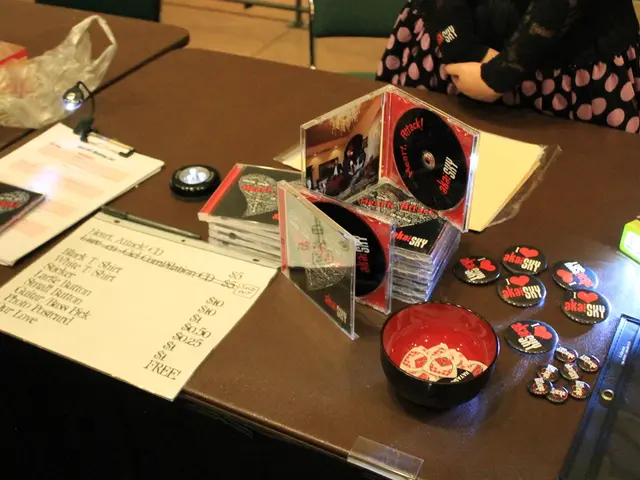What's Poker Rake, Explained for Casual Players
Poker's Rake Explanation: Unveiling a Casino's Profit-Making Strategy
Get the lowdown on poker rake - that hidden fee casinos charge for hosting games. Here's what you need to know:
What Exactly is Poker Rake?
In a nutshell, rake is the fee casinos charge players to maintain their poker rooms. It's how they fund staff salaries, utilities, and other operational costs - not forgetting those free cocktails and snacks you indulge in while gambling.
Online poker operators also charge a rake to cover their platform costs, marketing, promotions, and other expenses. So, buckle up as we go over the ins and outs of poker rake!
Image Credit: BorisVetshev/Shutterstock
How Does Poker Rake Work in Practice?

Rake, often called a "fee" or "commission," is there to keep the game running. Most casinos collect a certain percentage of each pot, depending on its size. As players bet and call, the dealer tracks the pot size and sets aside a share for the house.
Whether you're playing in a physical casino or online, the process is flow:
- The casino (or online platform) gathers the rake from each pot.
- When playing in-person, the dealer puts the chips into a metal box attached to the table (known as the "drop").
- In the digital world, the platform software automatically deducts the rake from each pot.
Different Strokes for Different Rakes
The way rake is calculated varies depending on the casino or platform, with local gaming laws playing a role too. Here are some common rake formats in poker:
- Pot Rake: A popular choice where the house takes a percentage of the pot, ranging from 2.5% to 10%. Most casinos also set a maximum rake per pot, usually between $4 to $5.
- Fixed Fee: Some casinos charge a set amount per pot, regardless of its size.
- Dead Drop: This method involves charging a fixed fee to players on the button (the dealer's position) before each hand.
- Time Collection: Popular in high-stakes games, players pay an hourly fee for being in the game.
- Membership and Seat Fees: These are common in poker clubs that operate under social club rules, treating rake-free poker as an extra membership fee.
- Tournament Fees: While associated with cash games, the term "rake" is also used in poker tournaments. Fees cover the costs of running the tourney.Image Credit: Gelner Tivadar/Shutterstock

Navigating Rake as a Player
Rake eats away at your winnings, so you'll want to mitigate its effects. Here's a few tips to manage poker rake:
- Play Fewer, But Stronger Hands: Stick with strong starting hands to avoid losing more often and paying the rake for unprofitable hands.
- Make Every Pot Count: Build larger pots with strong hands to limit the impact of rake. The bigger the pot, the less rake takes a bite out of your winnings.
- Get Aggressive in Short-handed Games: Short-handed tables mean more opportunities for rake, so be more aggressive to outplay opponents and make the most of your time at the table.
- Adapt to Limit Games: In limit games, the fixed bet sizes mean rake can take a bigger share compared to no-limit games. Consider playing no-limit for a better rake-to-winnings ratio.
A Closer Look at Rakeback
Some online poker platforms offer rakeback as a rewards feature. This means you get back a percentage of the rake you've paid over time. The percentage varies based on the platform. To maximize your earnings with rakeback, focus on platforms with higher rakeback percentages and generate more rake to earn more cash back.
Legalizing Poker Rake

Gambling laws differ from one jurisdiction to another, which may affect how casinos collect rake. In many areas, only licensed casinos are allowed to charge rake, with associated fees and taxes paid to the government.
Playing un-licensed home games may involve illegal gambling charges, so be aware of your local laws before hosting a rake-taking game.
Rake at Home Games: Proceed with Caution
While rake can be a part of home games in some jurisdictions, this can tip the scales from legal home games to illegal gambling. Make sure you're on the right side of local gaming laws and be cautious about participating in raked home games to avoid legal complications.
Title Image Credit: Gelner Tivadar/Shutterstock
- The recent casino-and-gambling industry trends have seen an added focus on the rates at which casinos collect rake from poker games.
- In the business world, finance departments often scrutinize the rackings of casinos, considering both the rake charged on casino-games like poker and the cost of beverages provided to patrons.
- For those who enjoy playing casino games like poker, it's crucial to understand how rake can impact the final profit margin, as the extra fees can significantly affect the bottom line in the long run.
- Casinos have started to introduce innovative rake structures, such as per-hour charges and tournaments fees, to optimize their revenue and cater to diverse player preferences.
- As more states legalize poker and other casino-games, the regulations governing rake collection will play a pivotal role in shaping the financial landscape of the casino industry.
- Given the complexities surrounding rake and the legal implications of operating unlicensed poker games, it's essential for enthusiasts to stay informed and adhere to the rules set by the industry and their respective jurisdictions.





